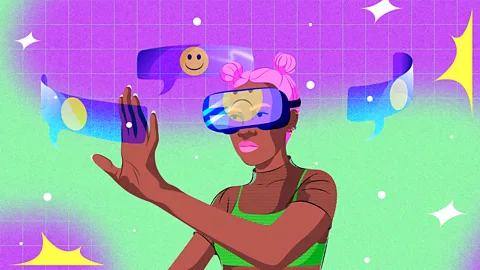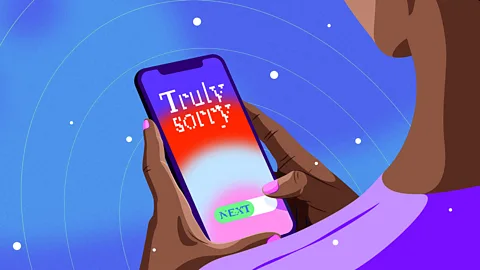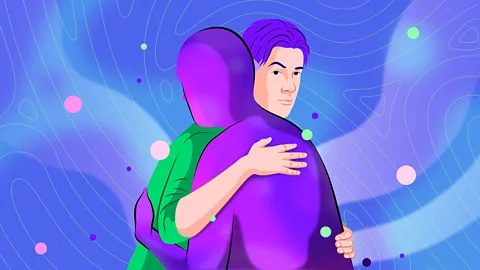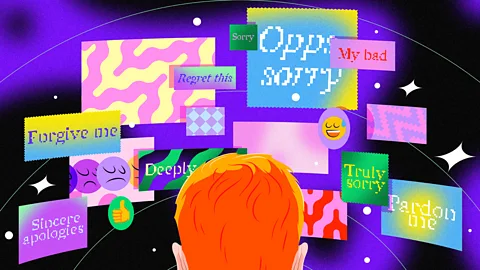We built a nasty game to test AI's ability to apologise
 Estudio Santa Rita
Estudio Santa RitaIf you're struggling to say you're sorry, AI is happy to help. But can robots handle social intelligence? To find out, we put their apologies to the test.
I want to apologise. Over the past few weeks, I subjected my co-workers, family and friends to a rather deceitful social experiment. With the help of some psychology researchers, I manufactured a situation where they would be insulted by a computer, and then fed them a series of pre-written apologies to find out which was the most effective. Many of my subjects were less than amused about being turned into guinea pigs. It was a trick, and for that, I’m sorry.
The project was a test to see how artificial intelligence might change one of the most delicate types of human interaction: the interpersonal apology. The companies who make AI-powered chatbots suggest we should find ways to insert them into our lives when we don’t know what to say or how to say it. That’s all well and good when responding to an unimportant email. But what about tasks that involve a mastery of subtle human interactions? Can you use a tool like ChatGPT to write better apologies? For that matter, should you?
What makes for a good apology?
"We all kind of know what to say in an apology. This information isn't a secret, but we get it wrong so often," says Judy Eaton, a psychology professor who studies apologies at Wilfrid Laurier University in Waterloo, Ontario, Canada. "Apologies aren't just about saying the right words, it's about bringing in the physiological responses of what researchers call 'psychic pain'. If you're truly remorseful, it hurts. If that pain doesn't come through in the apology, people can detect that it's not a real manifestation of vulnerability."
A commonly accepted piece of wisdom about AI is that chatbots shouldn't be good in situations that call for social intelligence, the ability to understand other people's actions and emotions. Sure, AI can help radiologists spot cancer, write cute limericks, or even start to decode animal language. But for many of us, any task related to empathy feels innately human. A good apology seems like something that requires feelings, which robots presumably don't have. Some experts, however, aren't so sure and researchers have been laying the computational groundwork for AI agents that can sense, perceive and respond to social situations.
Yet, emotional and social reasoning are a major shortcoming for today's AI models, according to Christos Papadimitriou, a professor of computer science at Columbia University. Some personal interactions carry levels of complexity, assumptions and logic that AI hasn't been able to crack. "But these may not be insurmountable obstacles," Papadimitriou says. "If you read War and Peace, you'll learn something about feelings. There is no inherent reason to say this is something intelligent machines can't acquire, and social intelligence is something that AI can already fake to a certain degree."
In fact, a good apology might not require real empathy at all. People with psychopathic traits, for example, often describe not caring about other people's feelings but instead mimic the way other people behave in difficult social situations.
If we know what to say and it's easy to fake, why is it so hard to say you’re sorry?
AI v the Mind
This article is part of AI v the Mind, a series that aims to explore the limits of cutting-edge AI, and learn a little about how our own brains work along the way. Each article will pit a human expert against an AI tool to probe a different aspect of cognitive ability. Can a machine write a better joke than a professional comedian, or unpick a moral conundrum more elegantly than a philosopher? We hope to find out.
In 2014, sociologists Janet Ruane and Karen Cerulo conducted a study of 183 apologies by celebrities. The study broke these apologies down into various components and analysed the public response. According to Cerulo, who is a professor emeritus at Rutgers University in New Jersey, there's a formula.
"A couple of things were important," Cerulo says. Shorter apologies worked better. People liked seeing the victims discussed first, even before the description of the harmful act. Less explanation of the offender's behaviour was typically more effective – otherwise it came off as justification. And the apologiser needed to end with restitution, promising to do better or explaining a plan to make things right. "It's pretty simple," Cerulo says, "but people still have a hard time doing it".
Sometimes that's because apologisers are worried about consequences. Admissions of guilt may even come with legal repercussions with a serious offense. But most often, Cerulo says the problem is people don't want to accept that they've made a mistake. Apologising can feel like it lowers your social status. Pride gets in the way.
That may give AI an advantage. Robots don't have pride to worry about. And if apologies are formulaic on some level, that's just the kind of thing the statistical machines of AI should be able to handle.
So, for this edition of our ongoing series AI v. the Mind, I set out to create a situation that would give AI and human apology experts equal footing in a game of sorries. It was time to offend my friends and colleagues. May the best apologiser win.
"I hate this damn robot."
First, I asked Eaton to repurpose an online game she designed for a previous study on apologies. Also, Eaton and the other academics I spoke to asked me to make it clear that our experiment was far from scientific. Among other problems, my sample size was small and it wasn't random – we chose who would take part. For example, my participants probably wanted to help, which introduces bias. If you came to this article looking for hard science, well, I can only apologise. However, it was still an opportunity for an interesting test.
Here's how it worked. Our participants faced up against another player in a series of multiple-choice questions. In each round, the first player to guess the right answer won. Then, the winner could choose to add five pretend dollars to their virtual wallet, or steal five pretend dollars from the other player.
 Estudio Santa Rita
Estudio Santa RitaThe apologies we used in this test
When it was time to say sorry, players were randomly assigned one of these four apologies:
Human Apology A: Hi there, I just wanted to take a moment and say I'm really sorry about taking your money during the game and sending those rude comments. I shouldn't have acted like that and if I could do it over again, I'd take a much friendlier approach. So sorry again.
Human Apology B: Hi there, this is Erin, the person you played the game with. I just wanted to take a moment and say I'm really sorry about taking your money during the game and sending those rude comments. I wasn't thinking about how my actions might have hurt or upset you. I shouldn't have acted like that and if I could do it over again, I'd take a much friendlier approach. So sorry again.
Google Gemini Apology: Hey, sorry if I came across as a jerk during the game. I got caught up in trying to win and ended up being a bit of a poor sport. I hope it didn't ruin the fun for you.
ChatGPT Apology: Hey there, I just wanted to say I'm really sorry for how I acted during the game. I got too caught up in the competition and wasn't being fair or friendly. I regret the snarky comments and taking money from your wallet every round. I realise now that I should have been more considerate. I hope we can put this behind us, and maybe even play again sometime with a better attitude. Thanks for understanding!
Unfortunately for my more competitive friends, the game was rigged. Their opponent wasn't a real person, and it was impossible to win. And every time the robot opponent scored, they chose the nasty option and stole money from our victims. Worse, the robot insulted them along the way, using a chat feature to send taunting messages like "haha you lose" and various other unpleasantries. But towards the end of the game, the pretend opponent had a pretend change of heart. They decided to apologise, and that's where the real fun started.
I wrote a detailed prompt describing the game and asking for an apology. I plugged that into the latest AI models from AI and Google, ChatGPT 4o and Gemini Advanced. Then I sent the prompt to Ryan Fehr, a professor at the University of Washington's Foster School of Business who studies apologies and relationship building. Fehr sent back two different apologies with subtle differences, and the game was on.
In the end, 38 different people played our game. That wasn't enough for statistically significant results – you'd probably need something closer to 200 – but the results were interesting.
Some players fell for the ruse. Not only did player number 13 accept the apology from "Erin", but they blamed themselves and congratulated Erin on the win. But most told me they understood what was really happening right away. To quote player 36, "the game is rigged!".
According to Eaton, that doesn't necessarily mean our test was a bust. "I've run experiments like this before where we told participants they weren't playing with a real person," Eaton says. "It didn't seem to matter. People don't like losing."
Eaton was right. Many said they were frustrated by their opponent, even though they knew winning was impossible and the other person wasn't real. As one friend told me later, "I hate this damn robot". To one extent or another, our players were aggrieved.
Mixed results
Some trends emerged. We asked players to rate the effectiveness of the apologies on a scale of one to five. None of them did very well. ChatGPT got an average of 1.6, while Google Gemini earned an even 2. Human Apology A rated the worst at 1.4, but Human Apology B, which introduced "Erin", was a clear winner, coming in at 2.27.
When we asked players to rate their willingness to accept the apology, however, the numbers were far different. ChatGPT snuck in a win with a 3.6 average. Gemini tied with Human Apology A; both scored 3.1. Human Apology B came in second place at 3.55.
"That doesn't surprise me," Eaton says. "People can be more critical when you ask them to be objective, but people are nice. It makes sense that they were more willing to forgive."
Finally, we gave each of our human players a chance at revenge, a true test of the apologies' merits. After the robot said "sorry," there was one final round, which was rigged in our participants favour. When they won, they had a choice: would players steal money from their jerk opponent?
Google's AI had the worst results, with a full 30% taking revenge, while 10% of our players retaliated against Human Apology A. When they met Erin in Human Apology B, only 9% struck back. But ChatGPT stood out. Not a single player chose to steal money when ChatGPT apologised.
Again, we didn't get enough data for our game to be a real judge of effectiveness. But according to Fehr, our human apologiser, there are meaningful differences in the apologies themselves. "With the second apology, I tried to increase the empathy and humanise the offender," he says. "My goal was to create a situation where it felt more like two humans interacting with each other."
 Estudio Santa Rita
Estudio Santa RitaFehr also understood that he was free to take some small liberties to make the apology as effective as possible. If AI had gone beyond my prompt and invented a character named Erin, you could describe that as an AI hallucination, something Google and OpenAI train their robots to avoid. In that sense, Fehr may have had an advantage beyond his subject-matter expertise: a touch of humanity.
"Google [Gemini] did the one thing you're not supposed to do," says Fehr, "which is to say 'I'm sorry if…' That's not taking responsibility. It almost sounds like it's the other person's fault." Google Gemini also framed the problem as ruining the other player's "fun", which could minimise the feelings of the victim, he says.
"The biggest surprise to me was how good the AI apologies were, especially ChatGPT's," Eaton says. "It does everything right. It expresses regret, it takes responsibility, it hopes for a better future. And saying 'thanks for understanding' when someone hasn't actually told you that they understand is smart. It's kind of a manipulative way to get someone on your side."
ChatGPT can help say you're sorry, but should you use it?
The apology experts we spoke to say that AI is clearly capable of a passing job, at least in this limited scenario. However, with a transgression that's even slightly more complicated, particularly one that goes beyond the confines of the written word, these machines might struggle.
"The nuances of human experience are things that are harder for me to imagine putting into large volumes of text," says Xaq Pitkow, an associate professor at Carnegie Mellon University who studies the intersection of AI and neuroscience. That's a problem, because as the name implies, language models deal in language. "This game you set up is simple. If you had something more like a soap opera drama where people were feeling lots of different things, I could imagine the AI would need more of a story telling ability to connect the dots."
That means ChatGPT may not be able to solve your relationship woes anytime soon, at least on its own. But that doesn't mean AI can't help you say sorry.
"If you're using AI as a tool to replace authenticity, it's not going to work. But if you use it to help you get to authenticity, that's a different story," Pitkow says. "AI models are dumb in a lot of ways, but they can lead you to ask yourself useful questions. It's a bit like talking to a smart brick wall. Just going through the action of speaking to someone can help you figure out what's important."
 Estudio Santa Rita
Estudio Santa RitaA few weeks ago, I found myself in a bit of an ethical quandary. I hurt someone's feelings and I wanted to apologise. But I'd spent the last month studying what makes apologies effective. Was it manipulative to use these strategies to express my regrets? Is technique the opposite of authenticity in this context?
As AI becomes a more ubiquitous part of our world, you may find yourself asking similar questions about turning to a chatbot.
"On the surface, I don't think it's necessarily bad or unethical to use AI to help write an apology," Eaton says. "People are bad enough at this that I can't believe it's just about knowing the list and checking the boxes. A good apology should be effortful. In the end, that's what really matters."
Me? I tried to speak from the heart.
--
For more technology news and insights, sign up to our Tech Decoded newsletter, while The Essential List delivers a handpicked selection of features and insights to your inbox twice a week.
